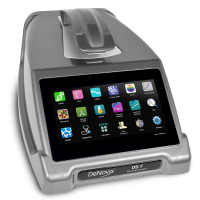
Spectrophotometry is a fundamental technique in university teaching labs, but several common problems can arise that may impact the accuracy and reliability of results. University teaching labs have specific requirements for spectrophotometers to ensure they are effective educational tools. These needs can be broken down into several key areas, many of which the new DeNovix DS-7 spectrophotometer can address:
Accuracy and precision
- Reliable measurements: Instruments must provide accurate and reproducible results to ensure that students can trust their data.
- High sensitivity: Ability to detect low concentrations of nucleic acids and proteins to demonstrate principles effectively.
- Contamination detection: Lack of experience often leads to contamination of samples due to bad practice, such as improper use of pipettes. It is important this can be detected for accuracy of results.
DeNovix DS-7 solutions: SmartPath™ technology algorithms provide real-time pathlength optimisation of every sample. The instrument has an absorbance precision of 0.04 AU (1 cm) or 2%, whichever is greater, wavelength precision of 1nm, and absorbance accuracy of 2% at 0.75 AU at 260 nm. It displays purity ratios for every sample to facilitate contamination detection.
User-friendliness
- Intuitive interface: Easy-to-navigate controls and software that students can quickly learn and use without extensive training.
- Clear display: Large, easy-to-read screens that display important information such as absorbance, wavelength, and sample ID.
DeNovix DS-7 solutions: The DS-7 instrument comes with a 7” HD colour touchscreen which displays the powerful EasyApps™ software - easy-to-use, intuitive software designed by life scientists, for life scientists.
Durability and maintenance
- Robust construction: Durable design to withstand frequent use by inexperienced users.
- Easy maintenance: Simplified maintenance procedures and readily available parts to minimize downtime.
DeNovix DS-7 solutions: The DS-7 is a maintenance-free , with no recalibration required for the lifetime of the instrument. Every unit comes with a 2-year warranty as standard.
Versatility
- Wide wavelength range: Capable of covering a broad spectrum of wavelengths to be applicable for various experiments across different courses.
- Multiple measurement modes: Support for different types of measurements (e.g., absorbance and fluorescence) to expand the range of possible experiments.
- Ease of transport: Teaching lab instruments often need to be moved from lab to lab for use across different practical classes and need to have a small footprint to work in the sometimes limited bench space of these labs
DeNovix DS-7 solutions: The DeNovix DS-7 covers the full UV-Vis spectrum with a wavelength range of 190-840nm. An optional fluorescence module is also available as an upgrade to increase the instrument’s versatility and application. It allows for 1 µL microvolume UV-Vis and optional cuvette absorbance with a measurement range of 2 – 15,000 ng/µL for dsDNA. The instrument is compact and lightweight, meaning it takes up very little space and is highly portable.
Cost-effectiveness
- Affordable pricing: Reasonably priced to fit within the budget constraints of educational institutions.
- Low operating costs: Minimal costs associated with consumables, maintenance, and repairs.
DeNovix DS-7 solutions: This latest model is based on the award winning DS-11 technology but at a budget-friendly price. It is maintenance free, which significantly reduces running costs, and is covered by warranty for the first 2 years.
Data management
- Data export and storage: Capability to easily export data to external devices or network storage for further analysis and record-keeping.
DeNovix DS-7 solutions: The DS-7 comes equipped with USB ports for easy data transfer and can also connect to label printers for labelling samples with their data.
By understanding and addressing these common problems, the reliability and educational value of spectrophotometry in university teaching labs can be significantly improved.
Importance of hands-on practical experience for university students
By meeting the above requirements, spectrophotometers can greatly enhance the learning experience in university teaching labs, helping students to better understand and apply key concepts in their studies. Hands-on experience in spectrophotometry is crucial for students in teaching labs for several reasons:
Practical understanding of theoretical concepts: Spectrophotometry is a fundamental technique in various scientific fields. Hands-on experience helps students understand the practical applications of theoretical concepts they learn in lectures, such as Beer-Lambert law, absorbance, transmittance, and the relationship between concentration and absorbance.
Skill development: Operating a spectrophotometer requires technical skills that can only be developed through practice. Students learn how to handle the equipment properly, which is an essential skill for future laboratory work and career.
Data analysis and interpretation: By engaging in hands-on spectrophotometry, students gain experience in collecting, analyzing, and interpreting data. They learn to identify sources of error, understand the significance of their results, and make informed decisions based on their data.
Problem-solving and critical thinking: Practical experience encourages students to think critically and solve problems. They encounter real-world challenges, such as instrument malfunction, sample preparation issues, and unexpected results, and must troubleshoot these problems.
Overall, hands-on experience in spectrophotometry equips students with essential technical skills, reinforces theoretical knowledge, and prepares them for future scientific endeavors.
The DeNovix DS-7 is now available for demonstrations. If you would like to request a demo to learn more about the instrument and if it would be suitable for your lab, please contact our instrument specialists.
